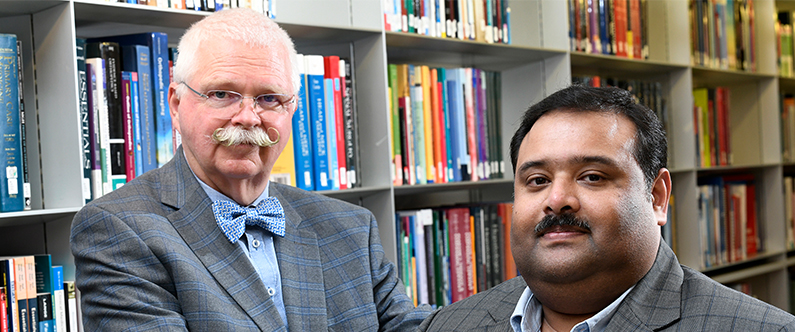WCM-Q project probes anti-cancer properties of plant-based compounds
 WCM-Q researchers Dr. Dietrich Büsselberg and Dr. Samson Mathews Samuel were central to a large-scale international research project investigating the anti-cancer properties of dozens of plant-based compounds.
WCM-Q researchers Dr. Dietrich Büsselberg and Dr. Samson Mathews Samuel were central to a large-scale international research project investigating the anti-cancer properties of dozens of plant-based compounds.
A large-scale international research project led by scientists at Weill Cornell Medicine-Qatar (WCM-Q) has painstakingly reviewed the anti-cancer properties of dozens of naturally occurring compounds found in plants.
Researchers at WCM-Q and contributing institutions in India, Korea, Taiwan, Slovakia, Poland and the Czech Republic analyzed thousands of research papers to uncover the tumor-busting effects of compounds found in a long list of plant or plant-derived natural products, including tea, berries, grapes, carrots, fungi, garlic, nuts, cardamom, turmeric, vitamin C, wasabi, mustard, lichen and many more.
The results of the investigations have been published in a series of 17 articles (10 review articles and seven research papers) in a special issue of the journal Biomolecules that was commissioned by the publishers following the success of an earlier paper by WCM-Q’s Dr. Dietrich Büsselberg, which investigated the effects of various natural compounds on ‘triple-negative’ breast cancers, a highly aggressive, treatment-resistant form of the disease. That paper, titled The Yin and Yang of Natural Compounds in Anticancer Therapy of Triple-Negative Breast Cancers, was published in the journal Cancers in September 2018.
Dr. Büsselberg, professor of physiology and biophysics at WCM-Q, said: “There is a vast amount of excellent research available about the anti-cancer effects of hundreds of different naturally occurring compounds, but it is scattered and extremely time-consuming to digest. This is a loss to the scientific community because it means that the potential for some plant-derived compounds to be used to help prevent or even treat some cancers is possibly being missed.
“We were delighted when Biomolecules approached us about the special issue, which has allowed us to review and collate as much of the existing research as we could. This has enabled us to provide a comprehensive but highly focused resource that others can use to easily and quickly access relevant information on the anti-cancer effects of many plant-derived compounds.”
The researchers collated existing research on natural compounds with anticancer potential such as stilbenoids (found in a variety of plants and some berries), curcumin (found in turmeric), resveratrol (found in the skins of grapes and berries), luteolin (found in many herbs and vegetables), several classes of phenolic compounds (found in lichens), rutin (plentiful in apples, figs and citrus fruits), and many others. One paper in the series, co-authored by WCM-Q’s Prof. Chris R. Triggle, professor of pharmacology, investigated the prospects of the commonly prescribed diabetes medication metformin as an anticancer treatment. Metformin was originally derived from the French lilac plant, which has been used in traditional medicine as treatment for hyperglycemia for centuries.
While the earlier study focused exclusively on the effects of natural compounds on triple-negative breast cancers, the newer papers also probed their effects on brain cancer, leukemia, gastrointestinal cancer and cancer stem cells.
WCM-Q researchers Elizabeth Varghese, senior research specialist, and Dr. Samson Mathews Samuel, research associate in physiology and biophysics, were also instrumental in the project. Dr. Samuel said: “There is potential for some of these natural compounds to be used alongside conventional anti-cancer therapies to improve outcomes for some cancer patients, which is an extraordinarily exciting prospect.”
Dr. Büsselberg and his team are supported by NPRP grant [NPRP 11S‐1214‐170101] from the Qatar National Research Fund (QNRF, a member of Qatar Foundation). The conclusions reached in the publication are solely the responsibility of the author[s].
The series of 17 papers in the special edition of Biomolecules, an open-access journal, can be read free of charge here.